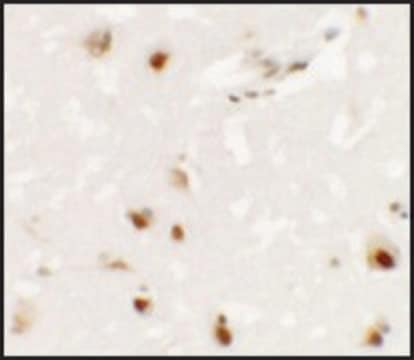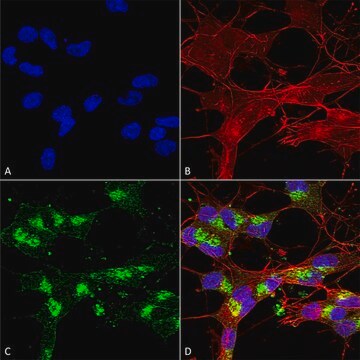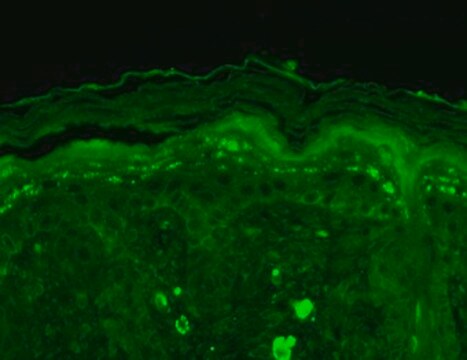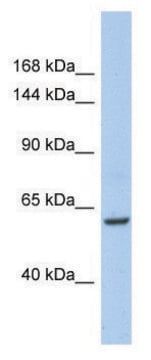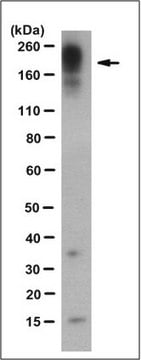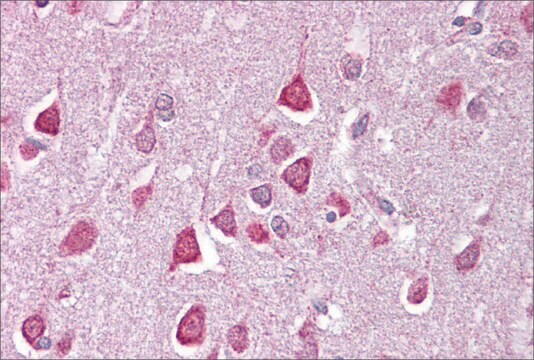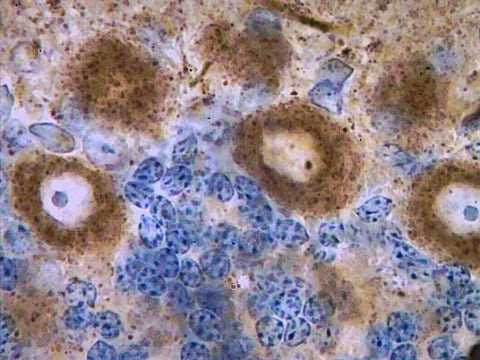HPA003446
Anti-SHANK3 antibody produced in rabbit
Prestige Antibodies® Powered by Atlas Antibodies, affinity isolated antibody, buffered aqueous glycerol solution
别名:
Anti-Fragment, Anti-ProSAP2, Anti-Proline-rich synapse-associated protein 2, Anti-SH3 and multiple ankyrin repeat domains protein 3, Anti-Shank3
登录查看公司和协议定价
所有图片(4)
About This Item
推荐产品
生物源
rabbit
品質等級
共軛
unconjugated
抗體表格
affinity isolated antibody
抗體產品種類
primary antibodies
無性繁殖
polyclonal
產品線
Prestige Antibodies® Powered by Atlas Antibodies
形狀
buffered aqueous glycerol solution
物種活性
human
技術
immunohistochemistry (formalin-fixed, paraffin-embedded sections): suitable
免疫原序列
PSGSTFIHPLTGKPLDPSSPLALALAARERALASQAPSRSPTPVHSPDADRPGPLFVDVQARDPERGSLASPAFSPRSPAWIPVPARREAEKVPREERKSPEDK
UniProt登錄號
運輸包裝
wet ice
儲存溫度
−20°C
目標翻譯後修改
unmodified
基因資訊
human ... SHANK3(85358)
免疫原
SH3 and multiple ankyrin repeat domains protein 3 recombinant protein epitope signature tag (PrEST)
應用
All Prestige Antibodies Powered by Atlas Antibodies are developed and validated by the Human Protein Atlas (HPA) project and as a result, are supported by the most extensive characterization in the industry.
The Human Protein Atlas project can be subdivided into three efforts: Human Tissue Atlas, Cancer Atlas, and Human Cell Atlas. The antibodies that have been generated in support of the Tissue and Cancer Atlas projects have been tested by immunohistochemistry against hundreds of normal and disease tissues and through the recent efforts of the Human Cell Atlas project, many have been characterized by immunofluorescence to map the human proteome not only at the tissue level but now at the subcellular level. These images and the collection of this vast data set can be viewed on the Human Protein Atlas (HPA) site by clicking on the Image Gallery link. We also provide Prestige Antibodies® protocols and other useful information.
The Human Protein Atlas project can be subdivided into three efforts: Human Tissue Atlas, Cancer Atlas, and Human Cell Atlas. The antibodies that have been generated in support of the Tissue and Cancer Atlas projects have been tested by immunohistochemistry against hundreds of normal and disease tissues and through the recent efforts of the Human Cell Atlas project, many have been characterized by immunofluorescence to map the human proteome not only at the tissue level but now at the subcellular level. These images and the collection of this vast data set can be viewed on the Human Protein Atlas (HPA) site by clicking on the Image Gallery link. We also provide Prestige Antibodies® protocols and other useful information.
生化/生理作用
SH3 and multiple ankyrin repeat domains 3 (Shank3), also known as proline-rich synapse-associated protein 2 (ProSAP2), is a protein encoded by the SHANK3 gene in humans and is located on chromosome 22q13. The gene is associated with the pathogenesis of Autism spectrum disorder (ASD). Mutation in this gene is one of the genetic factors for schizophrenia (SCZ). The gene may act as a valuable biomarker for dissecting the role of gene and environment interaction in the etiology of autism spectrum disorders (ASD).
特點和優勢
Prestige Antibodies® are highly characterized and extensively validated antibodies with the added benefit of all available characterization data for each target being accessible via the Human Protein Atlas portal linked just below the product name at the top of this page. The uniqueness and low cross-reactivity of the Prestige Antibodies® to other proteins are due to a thorough selection of antigen regions, affinity purification, and stringent selection. Prestige antigen controls are available for every corresponding Prestige Antibody and can be found in the linkage section.
Every Prestige Antibody is tested in the following ways:
Every Prestige Antibody is tested in the following ways:
- IHC tissue array of 44 normal human tissues and 20 of the most common cancer type tissues.
- Protein array of 364 human recombinant protein fragments.
聯結
Corresponding Antigen APREST73542
外觀
Solution in phosphate-buffered saline, pH 7.2, containing 40% glycerol and 0.02% sodium azide
法律資訊
Prestige Antibodies is a registered trademark of Merck KGaA, Darmstadt, Germany
免責聲明
Unless otherwise stated in our catalog or other company documentation accompanying the product(s), our products are intended for research use only and are not to be used for any other purpose, which includes but is not limited to, unauthorized commercial uses, in vitro diagnostic uses, ex vivo or in vivo therapeutic uses or any type of consumption or application to humans or animals.
未找到合适的产品?
试试我们的产品选型工具.
儲存類別代碼
10 - Combustible liquids
水污染物質分類(WGK)
WGK 1
閃點(°F)
Not applicable
閃點(°C)
Not applicable
個人防護裝備
Eyeshields, Gloves, multi-purpose combination respirator cartridge (US)
Shanshan Shao et al.
Molecular biology reports, 41(3), 1591-1595 (2014-01-09)
Autism spectrum disorder (ASD) is one of neurodevelopmental disorders with highly heritability. Recently, abnormality at the synapse is found to be important etiology of ASD. SHANK3 gene is suggested as a strong candidate gene for the pathogenesis of ASD, because
Stefanie Grabrucker et al.
Experimental neurology, 253, 126-137 (2014-01-03)
Recently, mutations in ProSAP2/Shank3 have been discovered as one of the genetic factors for schizophrenia (SCZ). Here, we show that the postsynaptic density protein ProSAP2/Shank3 undergoes activity dependent synapse-to-nucleus shuttling in hippocampal neurons. Our study shows that the de novo
Epigenetic dysregulation of SHANK3 in brain tissues from individuals with autism spectrum disorders.
Li Zhu et al.
Human molecular genetics, 23(6), 1563-1578 (2013-11-05)
The molecular basis for the majority of cases of autism spectrum disorders (ASD) remains unknown. We tested the hypothesis that ASD have an epigenetic cause by performing DNA methylation profiling of five CpG islands (CGI-1 to CGI-5) in the SHANK3
Sara M Sarasua et al.
Genetics in medicine : official journal of the American College of Medical Genetics, 16(4), 318-328 (2013-10-19)
Phelan-McDermid syndrome is a developmental disability syndrome with varying deletions of 22q13 and varying clinical severity. We tested the hypothesis that, in addition to loss of the telomeric gene SHANK3, specific genomic regions within 22q13 are associated with important clinical
Elisa Colombo et al.
Proceedings of the National Academy of Sciences of the United States of America, 118(47) (2021-11-17)
Nondegradative ubiquitin chains attached to specific targets via Lysine 63 (K63) residues have emerged to play a fundamental role in synaptic function. The K63-specific deubiquitinase CYLD has been widely studied in immune cells and lately also in neurons. To better
我们的科学家团队拥有各种研究领域经验,包括生命科学、材料科学、化学合成、色谱、分析及许多其他领域.
联系技术服务部门